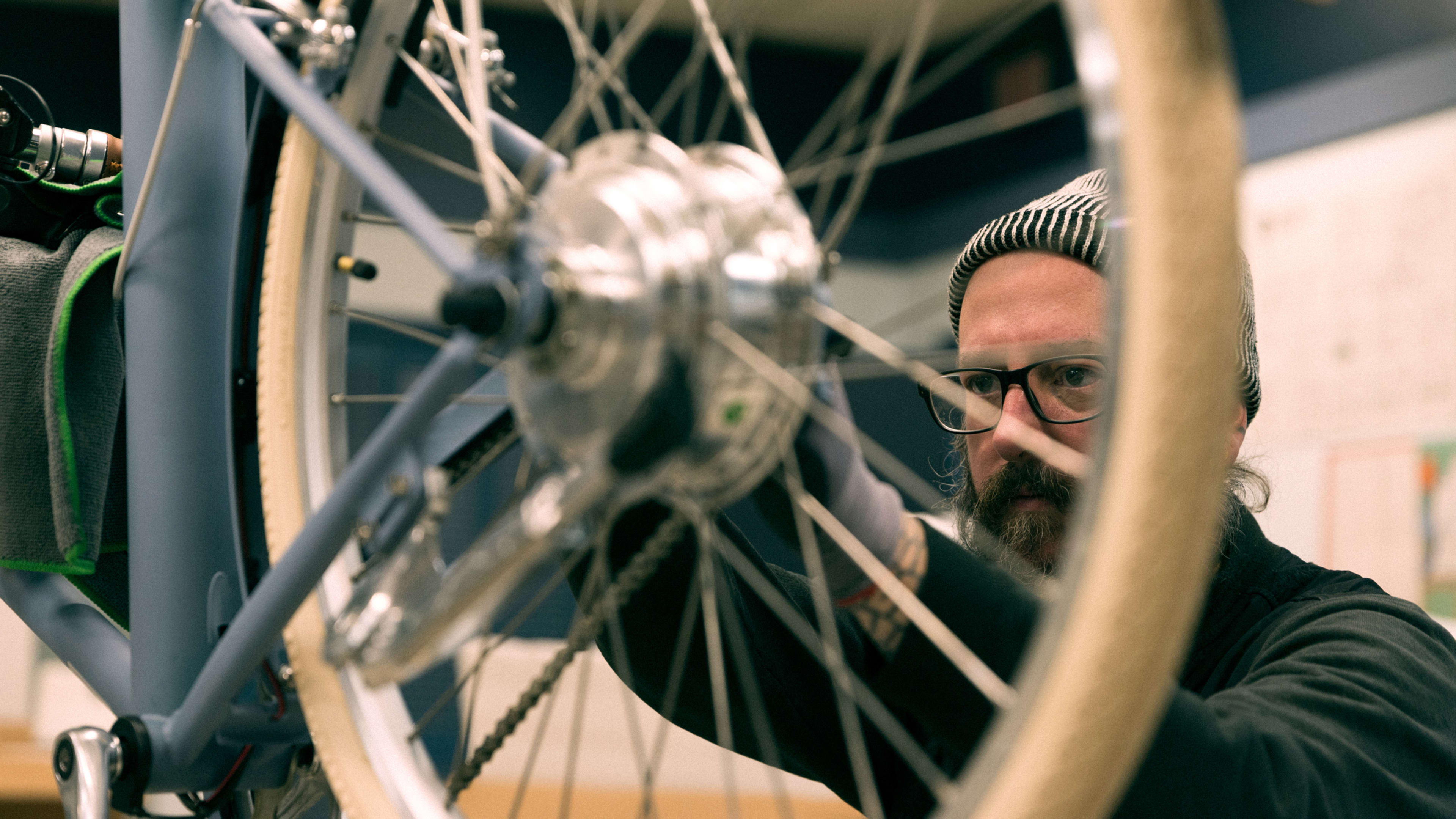Inside a 50,000-square-foot factory with walls lined by racks of metal and rubber, workers are machining steel tubes and welding them into the frames of sleek new electric bicycles. But unlike almost every electric bike now on the market, these are not being produced in China. The factory sits on a block of nondescript warehouses on the west side of Detroit, and the bikes are part of a small, but growing, number that are made in the United States.
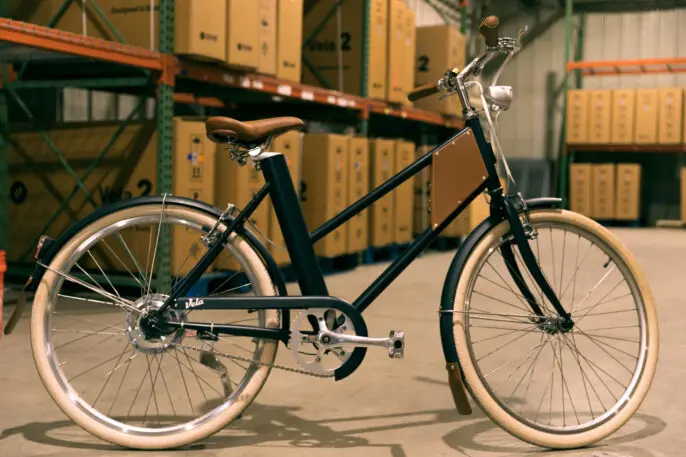
The factory belongs to Detroit Bikes, and it is producing bikes for Vela, a startup e-bike brand with two elegantly designed models aimed at city riders. With a signature oversized seat tube that doubles as the housing for the cylindrical battery, Vela’s $1,800 e-bikes are a more considered version of what can often come across as regular bikes that have had batteries and motors hacked onto their frames. With an estimated 1 million e-bikes being sold in the U.S. in 2022, Vela is aiming to corner the high-design end of the market.

Vela’s more elegant design is part of what’s brought the company to this factory in Detroit, according to company cofounder Justin Kosmides. Previously, the company was like almost every other e-bike maker in that it had been using factories in China to build its bikes. But shoehorning Vela’s unique design into these factories’ workflows—as well as the relatively low volume the startup was producing—proved challenging. Vela’s design was just too different from the cookie-cutter e-bikes these factories were creating for a plethora of other brands. “About 90% of them have the same design and the same battery pack,” Kosmides says. “We got kicked out of one of our first factories because Walmart came in and wanted an e-bike.”
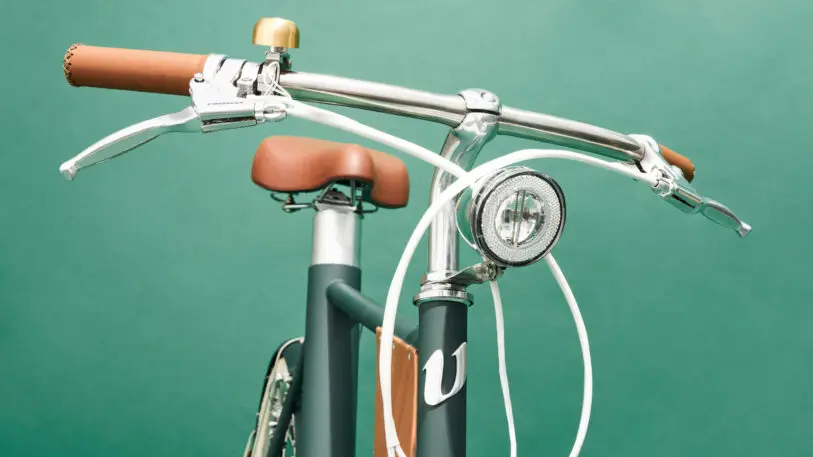
Vela’s more bespoke style was at odds with the mass market approach of most Chinese factories. Kosmides says leaving China was a decision to avoid “going down a rabbit hole of slapped-together cheapness.”
So the company began looking for alternatives. Through Vela’s participation in Newlab, an incubator and network for technology and mobility companies, Kosmides was connected with Detroit Bikes. Located just a few miles from Ford’s River Rouge plant, one of the largest car manufacturing plants in the world, Detroit Bikes is a small-scale complex packed with tons of steel and several heavily bearded welders. There’s a powder coating room capable of painting bike frames in thousands of colors, and workers rolling across the facility on old school skateboards. The factory has the capacity to make about 150 bike frames a day, and assemble 400 complete bikes. It’s a decade-old attempt to revive high quality bicycle manufacturing in the U.S. after nearly dying here. Electric bikes like Vela’s could be part of that revival.

Vela was founded by Victor Hugo Cruz in Sao Paulo, Brazil, in 2012. Cruz designed the bike at a time when the only e-bikes on the road were most likely conventional bikes that had been Frankensteined with motors from kits ordered off the internet. Vela, which is Portuguese for sail, began its first production run in 2014, and gathered a small but devoted customer base in Brazil. Four years later, after a chance meeting at a wedding in Italy, Kosmides joined Cruz to broaden Vela’s market beyond Brazil.
It was new professional territory for Kosmides, who grew up in Baltimore and worked in banking in New York out of college. But it was a familiar topic of passion. He’d been fascinated with bikes and e-bikes for years, seeing the wide adoption of urban bike share systems like New York’s Citi Bike, and wondering why most e-bikes on the road looked so clunky. He was living around the corner from the Dutch e-bike company VanMoof‘s store in Brooklyn, where he bought his own e-bike soon after they opened in 2015.
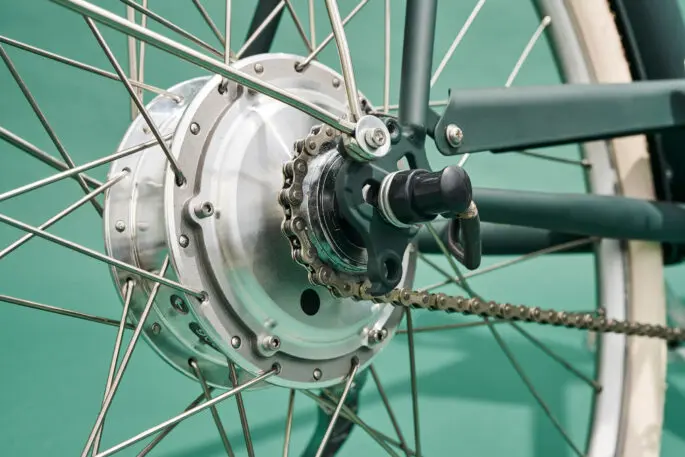
As an e-bike rider, Kosmides became acquainted with the under-considered reality of owning a bike with a built-in motor. Maintenance is not always possible at the typical bicycle repair shop. Servicing an e-bike is technologically complicated. Parts have to be shipped from around the world and company-specific technicians are often required to do even the most rudimentary fixes.
When he joined Vela, Kosmides wanted to find a way to make the servicing and maintenance of e-bikes a smoother process. Relying on factories in China proved unsustainable. Trying to get specific replacement parts quickly or make simple maintenance upgrades to the bike’s production design became nearly impossible. “You’re doing surgery from 5,000 miles away,” Kosmides says.
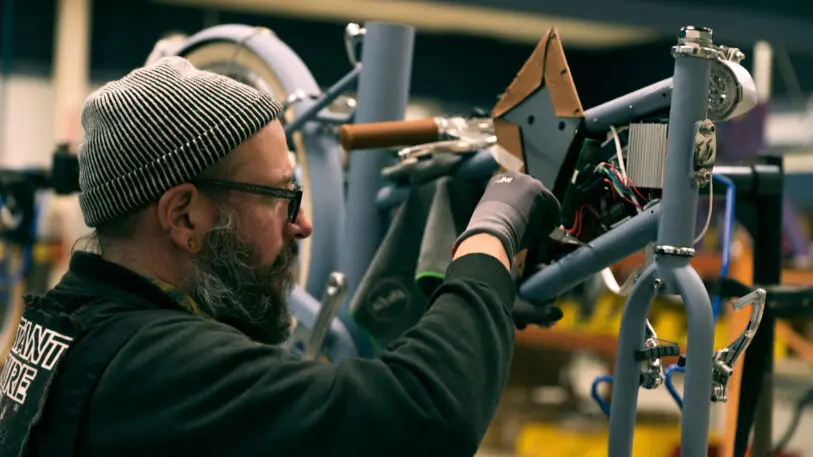
Detroit offered an attractive alternative.
The Detroit Bikes factory represents a surprising rebirth for the bicycle manufacturing industry—and a cautionary tale about just how complex it is to bring something back from the dead.
Launched in 2013, Detroit Bikes was started as both a bicycle company and a bicycle factory, building what had hardly been made in the U.S. for decades. About 80% of the world’s bikes are produced in China and Taiwan, and most of the rest in Europe. Founder Zak Pashak tapped into the local manufacturing prowess in Detroit, as well as a growing interest in cycling, to create a successful direct-to-consumer bike brand, designed and assembled in the U.S. That success eventually grew into production contracts for major retailers like Dick’s Sporting Goods. But supply chain issues during the pandemic exacerbated challenges for the business, and Pashak ended up selling the company, brand, and factory to Cardinal Cycling Group, itself an upstart investment and management company focused on the bicycle industry.
Since taking over early in 2022, Cardinal Cycling Group has positioned the Detroit Bikes factory as a manufacturing hub for bike brands, with an emphasis on e-bikes. The factory will soon be doing most of the manufacturing and all of the assembly of Vela’s electric pedal-assist bikes. (Many components of bicycles are still produced abroad.) The factory will also be an essential part of Vela’s servicing and maintenance network, which uses certified repair technicians around the country that can order replacement parts directly from the factory.
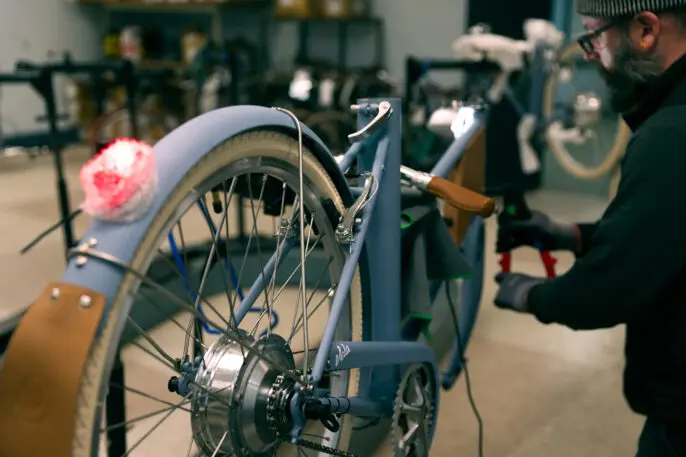
Walking through the factory on a recent afternoon, Kosmides is joined by the factory’s general manager, Gary Thornton, and TJ Karklins, of the Cardinal Cycling Group. They’re pointing out the various front forks and frame parts that come together to make a modern electric bike, for Vela and other brands. In a back corner of the factory, workers are finishing assembly on a line of heavy-duty off-road electric bikes from the brand Ristretto. Karklins says the factory will soon begin producing the cargo bikes popular in Europe. “There’s a lot of different markets to serve,” he says.
An oval-shaped assembly line stretches across one room, with movable racks holding the frames of Vela’s two models, as well as the conventional bike models produced under the Detroit Bikes brand. Kosmides steps up to a nearly complete Vela bike. “There are 153 different components in this bike,” he says, partly bragging, partly bewildered. Having all those components combined together is a complex puzzle, but he says doing it all in the U.S. is making the product better.

With no seat installed, the extra-large vertical seat tube and housing for the bike’s replaceable battery is even more apparent. Wedged in the trapezoidal space where the frame meets the handlebars is the other signature of Vela’s design, the leather wrapped control panel that contains what Kosmides calls the brains of the bike. Unlike competitor brands that tend to hide the circuit boards and computational guts deep within the frame, Vela’s design keeps them accessible but hidden behind the leather, which makes them easier to service and maintain.
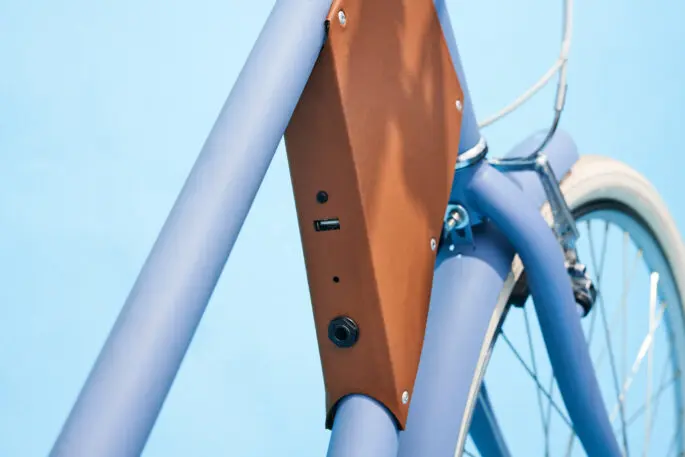
About 500 Vela bikes have been produced in 2022, mostly by Vela’s existing factory partners in China. With the move to Detroit, Kosmides says that figure will be 5,000 by the end of next year. Some production is underway now, and starting in spring, the Detroit factory will manufacture every bike Vela sells. The roughly 4,000 Vela bikes that have been sold so far represent a tiny piece of the e-bike market, but Kosmides says that with industry sales projected to hit $46 billion by 2026, Vela’s design-first bike will have a sizable audience.

Electric bikes are becoming a major part of Cardinal’s vision for the future of the Detroit Bikes factory, and luring a company like Vela is seen internally as a coup, having gotten some help from the state of Michigan. Long associated with the automotive industry, Michigan is trying to diversify beyond the car, according to Trevor Pawl, the state’s chief mobility officer.
“If you’re going to be the global mobility leader, which we think Michigan is, you can’t just focus on industry growth, you need to focus on community vitality. You need both to create places people want to be. You need to create a more multimodal ecosystem,” Pawl says. “That’s why I think it’s important to attract companies like Vela to Michigan and support them once they’re here.”
With local political support and an established manufacturing workforce, Karklins says Michigan is an ideal place for building e-bikes like Vela. “This bike is very doable in the United States. We’d like to say you can do it in every state, but you can’t,” Karklins says. “There’s no reason Detroit shouldn’t own the electrification of transportation in America.”
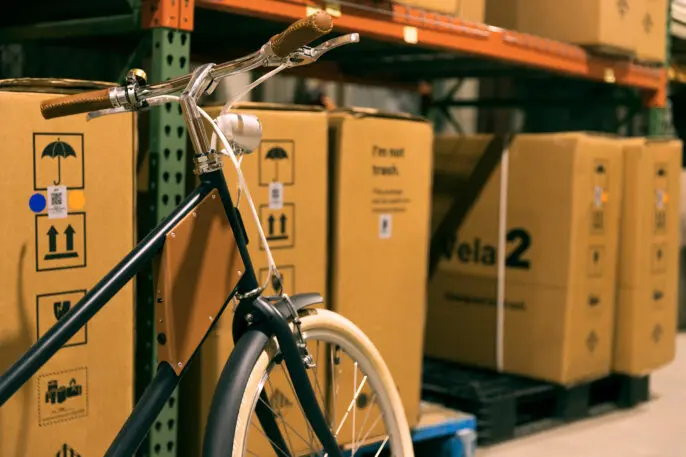
Production in the U.S. could become more financially sustainable, with the eventual resumption of imported e-bike tariffs and duties that had been paused during the pandemic. U.S.-made e-bikes aren’t subject to the 25% tariff added to those imported from China. Even imported bicycle wheels are subject to a 10% duty, which is why the factory now has two robotic machines that can thread, tighten, and straighten spokes onto aluminum wheel frames. “Assembly here makes so much more sense,” says Thornton.
Moving production to the U.S. will have some effects on the costs of production for Vela. Kosmides estimates it will cost $300 to $325 more per bike to be built in Detroit instead of China, mostly due to higher labor costs. He says the company hasn’t yet made a decision about how much, if any, of that cost will be passed on to customers.

But there are benefits, too, Kosmides says, including lower shipping costs, better quality control, the ability to adjust parts for errors, significantly shorter lead times for production, and the logistical relief for staff who no longer have to make calls to Chinese factories in the middle of the night.
For all the jingoistic undertones that come with claiming something is “Made in the U.S.A.,” Kosmides says Vela’s choice to bring production to the U.S. was influenced by improving quality and ease of production, among other concerns. Mostly, though, it was a straightforward business decision. “It needed to make economic sense for us to do it,” he says. “And it did.”
Recognize your brand’s excellence by applying to this year’s Brands That Matter Awards before the early-rate deadline, May 3.
